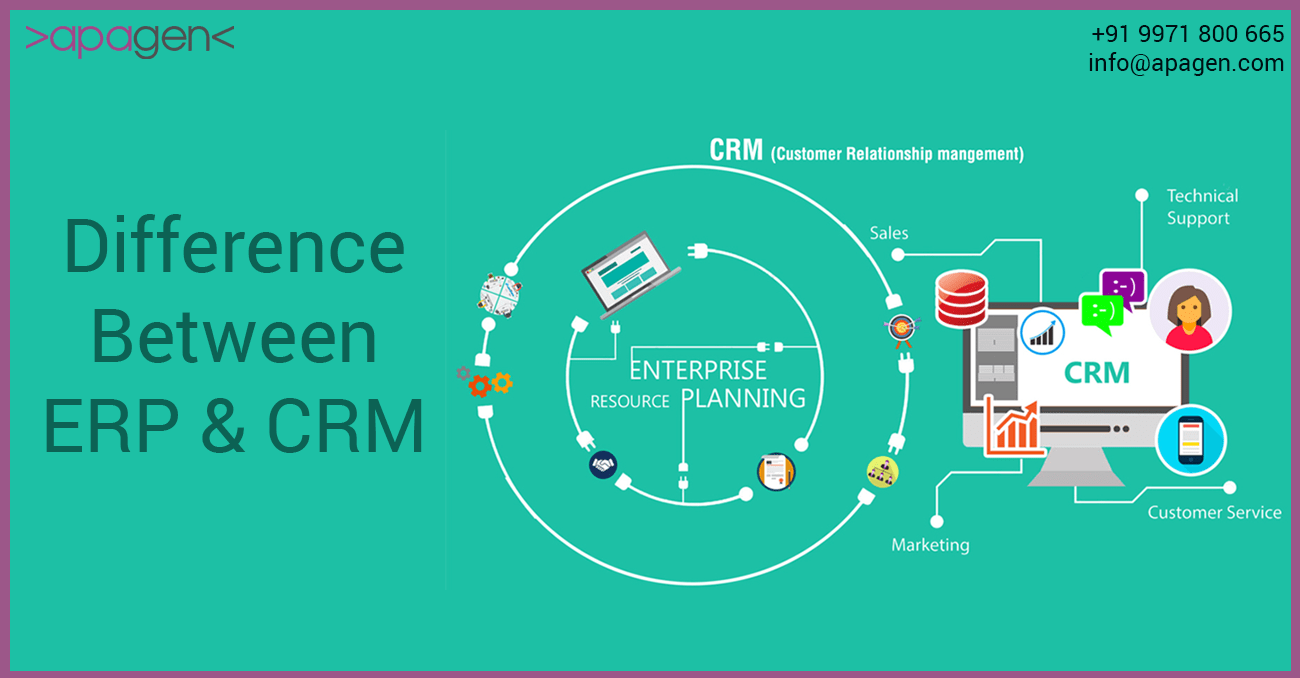
What is the Difference between ERP & CRM?
ERP and CRM software are precious tools that each manufacturer wants. While both will improve the total profitability of your enterprise, CRM software helps you manage your prospects, whereas ERP software helps you streamline your entire enterprise processes throughout your complete organization.
What is a CRM?
CRM stands for Customer Relationship Management and is software that helps manage how a customer interacts with your business. CRMs are strong tools that maintain monitor of each potential and present customer information in addition to manage your whole sales process. A CRM system will assist improve the profitability of your enterprise by enhancing sales team performance and growing your sales volume.
The primary focus of a CRM system is to make sure that customer needs are met in a timely and efficient method. This will make sure that customer satisfaction is maintained at excessive levels throughout the group and with each buyer interaction, resulting in extra satisfied prospects and elevated profits.
CRM software program is typically utilized by the gross sales, advertising, and customer support departments to do the following tasks:
- Keep track of consumers and their order history
- Automate and handle advertising campaigns
- Identify enterprise opportunities and new sales leads
- Manage the sales pipeline
- Streamline sales processes and reduce repetitive work
- Automate customer support
- Facilitate better help for present clients
- Create correct data reports
- Learn which products promote best and when
Better Sales Performance
A CRM centralizes your whole sales data in a single place permitting your sales team to handle all accounts, leads, opportunities, and communications in one system. Well-documented details about a lead or shopper helps construct belief and respect with potential or present prospects and improve communication—which will increase the possibilities of closing a deal with a new client, or re-upping or upselling to a present customer.
The backside line is that an extra organized sales staff, and a better-managed sales pipeline, will lead to elevated close charges by your sales staff and improved returns on your firm.
What is an ERP?
In distinction to CRM software program that manages your buyer relationships, ERP software program will handle all points of your manufacturing enterprise. ERPs are integrated systems that join your complete enterprise, streamline your operations, improve productiveness—and decrease your total prices.
At their core, ERPs assist corporations run profitable manufacturing companies by connecting monetary and operational programs into one central database. This means that you can streamline enterprise duties and processes—in addition, to share error-free data throughout your complete group.
ERPs assist manufacturers with their inventory management, scheduling, capability planning, shop flooring management, quotes and estimates, accounting, human resources, production planning, project administration and so on.
Simply put, an ERP is the best solution for integrating individuals, processes, and technologies throughout an enterprise—the benefits of that are virtually countless:
- Connect and integrate all departments inside your group
- Share information between departments to streamline processes
- Standardize important enterprise procedures
- Reduce inventory prices
- Facilitate higher project planning
- Increase throughput by automating processes
- Use accurate data and experiences to trace progress, productiveness, and efficiency
- Deliver more jobs on time
- Lower purchasing prices
- Eliminate purchasing errors
- Increase user-adoption charges by means of widespread person expertise and design
- Reduce risk via improved information integrity and financial controls
- Lower operational prices
- Improve accuracy of financial data
- Improve job costing
- Simplify accounting processes
- Manage human resources
ERPs energy your small business with correct real-time data and assist you to extend efficiencies and enhance efficiency throughout your group.
Do I need CRM or ERP, or both?
Nearly all manufacturing corporations, from small companies to massive enterprises, want each software program programs. At the finish of the day, each CRMs and ERP assist you to enhance your enterprise’s profitability—however, they every do it in several methods, and each is important to your enterprise.
Both kinds of software streamline and automate your core enterprise processes: A CRM is targeted on the sales aspect of the group, whereas an ERP system is built-in and carried out throughout a number of departments. Each serves its personal distinctive objective, and every will assist you to enhance efficiencies, decrease prices, and improve profitability.
Get a CRM that is integrated along with your ERP
The best practice for manufacturers particularly advanced customized manufacturers is to get a CRM that is totally integrated along with your ERP.
As a manufacturer, your ERP system will become the spine of your manufacturing operation. A CRM that connects to—or higher but—is part of your ERP system might be immensely useful as it’ll seamlessly pass data between the two programs.
An Integrated CRM means you save time by not having to duplicate data between your two systems, and that your sales staff has access to price lists, previous offers, and your product configurator software. This makes it simpler for them to create quotes—a typical problem for customized producers. A fully integrated CRM system simply permits your sales team to use previous offers and different information to make correct quotes. Plus, if a product is extra advanced, they’ll shortly carry your engineering division into the process to develop and refine quotes to fulfil a customer’s actual needs.
Both ERPs and CRMs are important tools for your manufacturing enterprise. Investing in the right tools will enhance your shop’s performance and total profitability.

No Comments